Queen Nzinga: Warrior Queen of Angola Who Resisted Colonial Powers
I. Introduction to Queen Nzinga
Ah, Queen Nzinga—maybe you haven’t heard of her, but if you did, you’d know she’s not just any queen. She was the Warrior Queen of Angola, and she wasn’t about to roll out the red carpet for Portuguese colonizers in the 17th century. With her blend of fierce warrior spirit and diplomatic prowess, Nzinga stood up against colonial powers like a boss, proving that sovereignty isn’t just an abstract concept—it’s a life-and-death matter. Grab your history book (or, you know, find a decent documentary on Netflix), because we’re diving deep into this shining star of the Black resistance.
II. Historical Context of Colonial Angola
Let’s set the stage for this epic story. The 16th and 17th centuries were not what you’d call a vacation period for the Angolan kingdoms. Enter the Portuguese: armed, greedy, and ready to exploit the natural resources and indigenous populations of Angola—all while waving their ridiculous colonial flags. But wait, sweet Queen Nzinga wasn’t just going to sit on her throne and let this happen. No, she emerged from the chaos like a phoenix, fierce and determined to keep her kingdom from being swallowed whole by colonizers who thought they had the divine right to pillage Africa.
III. Early Life and Ascension of Queen Nzinga
Queen Nzinga wasn’t just plopped into power; she was born into it. The daughter of King Ngola Mbandi of Ndongo, she came out of the womb with a crown (figuratively, of course). And while other royals might have been playing the game of thrones, she was busy honing her diplomatic skills, chatting up European traders, and learning the ins and outs of colonial dealings like they were the latest gossip. After her brother was taken out of the game in battle, Nzinga seized the moment like a pro, ready to show the world that a woman can lead her people even when the odds are stacked against her.
IV. Queen Nzinga’s Diplomatic Strategies
Alright, let’s talk strategy. Queen Nzinga’s first act of defiance was to throw colonial expectations out the window. When confronted by Portuguese Governor Lopes de Lima, she famously refused to sit at his feet. Take that, colonial hierarchy! Her linguistic prowess and quick wit turned her into a master negotiator. She wasn’t just swinging swords; she was forging alliances and ensuring her people weren’t treated like mere collateral damage. Forget the “colonial welcome mat”—Nzinga was laying down her own terms, including some shrewd partnerships with the Dutch. It’s all about winning the game of chess, baby!
V. Military Leadership of the Warrior Queen
Did we mention that Queen Nzinga was a military dynamo? With the finesse of a seasoned guerrilla fighter, she knew how to use Angola’s geography to her advantage. Surprise attacks? She invented them! Her battle strategies were nothing short of genius, catching the Portuguese off guard during key confrontations like the infamous Battle of Ngoleme. But let’s not forget, she also revolutionized the role of women in warfare. Yep, the Queen was putting women at the forefront of her military campaigns—just another way she smashed those pesky gender norms. Sorry, colonizers; you’re not the only ones with tricks up your sleeve.
VI. Cultural and Societal Impact of Nzinga’s Leadership
Queen Nzinga wasn’t just about the sword and spear; she was also wielding significant cultural influence. Her era elevated women to leadership roles, igniting a sense of pride in her people like a motivational poster in a break room. Nzinga didn’t just resist colonial narratives—she flipped them the bird! She redefined what it meant to be a leader in Africa, proving that cultures aren’t just rich and complex; they’re also way more resilient than the powers trying to erase them.
VII. Legacy and Historical Significance of Nzinga of Angola
Nzinga’s legacy isn’t just a chapter in a dusty history book; it’s a powerful narrative that lives on in the hearts of many. Her relentless fight against colonialism has become a cornerstone of independence movements across Africa. Scholars today are finally giving her the credit she deserves as a key player in the struggle against oppression. She is now celebrated not only as a cultural icon but also as an embodiment of the unwavering African spirit rising up against adversities served up by the colonial powers.
VIII. Conclusion: Honoring the Warrior Queen
Queen Nzinga’s story is far more than just a historical note; it’s a battle cry for anyone who values resistance in the face of oppressive forces. Her deft balance of diplomacy and military strategy highlights why we must recognize and uplift figures like Nzinga in our understandings of colonial history. She reminds us that the threads of the past are intricately woven into the fabric of our present and future—because letting go of history means letting go of our identity.
IX. Suggested Further Reading about Queen Nzinga
- “Queen Nzinga of Ndongo and Matamba” by T. J. Jackson Lears is a great start if you want to dig more into her exceptional life.
- “African Queen: The Life and Times of Nzinga of Angola” by Patricia McCormick adds another layer to her story that you definitely want to explore.
- Or binge-watch “Nzinga: Warrior Queen of Ngola”—because sometimes, it takes a good doc to fully bring history to life!
X. Join the Conversation
So, what do you think about the fierce legacy of Queen Nzinga? Drop your thoughts below—let’s keep the conversation going! Share this post on social media because everyone deserves to know about the relentless spirit of the Black community that continues to thrive against oppressive forces. Together, we can honor Queen Nzinga and inspire even more warriors for future generations.



0 Comments